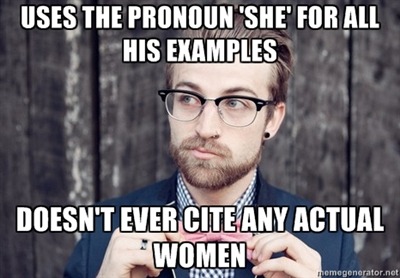
In 2013, a serious question began to play on the minds of American thinkers: Can you name five female philosophers?
Baltimore has just welcomed, from Dec. 27-30, an amazing initiation ritual, the appointment of a new generation of philosophers by their eldest. Universities are taking advantage of the holiday season to carry out their recruitment. It is during this period that the American Philosophical Association convention is held, which leads to vast employment opportunities. This is something that would surely spoil Christmas for anxious candidates.
From Chicago, Deborah Goldgaber made the trip of more than 1,100 kilometers in the hope of finding a position. Grinnell College, the prestigious university institution, wished to meet her and showed interest in her work on 20th-century France. “I’ve been looking for a permanent contract for three years. I keep working temporary contracts, without knowing where I will live in a year’s time, knowing I might have to move if I am offered a job outside of Illinois.”*
However, in Baltimore being a woman gives her an advantage as the profession, shaken by widespread re-assessment, is looking to feminize itself. In philosophy faculties, only one in five posts is held by a woman, according to calculations made by the faculties themselves — no official figures have been released. The debate had been gathering speed for several years, but it was the resignation of a star teacher, after accusations of sexual harassment in Dec. 2013, that sparked a change. In summer, job offers multiplied; The New York Times published a series of opinion articles in September regarding the welcome mat that philosophy is laying out for women.
Online enlistment is going strong, similar to the French feminist group “La Barbe,” a blog that reviews all of the conferences organized where not a single woman is invited.
Jennifer Saul, an American philosopher based in the UK, is on the cutting edge of the subject. Since 2010, she has been writing the blog “Being a Woman in Philosophy,” where she strives to defend women’s issues. “We don’t know how to explain this gap. Very few sociological studies have been carried out to understand philosophy’s struggle to keep up,” she said.* Various different studies are underway; the most widely accepted hypothesis is that we reject a candidate based on an “unconscious prejudice” if he or she does not fit in with the traditional image that we have of a profession.
Deborah Goldgaber has followed these debates with great interest. And in the discipline of the continental tradition, she cannot help noticing the challenge thrown at her colleagues practicing analytical philosophy, the dominant track in the U.S. How are the clarity and rigor to which they aspire possible, if our mind becomes bogged down in “unconscious prejudices”? It is a broad question.
Without waiting for it to be resolved, new practices are put in place. Analysis and Journal of Philosophy, two academic reviews, have recently put blind article selection and proofreading procedures in place, in order to prevent any negative slants. In 2013, Stanford University adopted a new editorial policy so that its online philosophy encyclopedia would cite more women. Some militants have begun to write Wikipedia articles about female authors so as to make them better known.
The APA is not to be outdone and has established a code of conduct intended for philosophy departments; the British Philosophical Association is about to follow suit. Recruitment is now more focused, a mentoring program has been set up, professional courtesy is now encouraged to avoid relationships sliding toward a friendship with blurry boundaries and training is offered to combat sexism.
However, the adverse effects of these good intentions have already begun to appear. “To combat the need for a more open system, certain universities ask me if I am prepared to become more involved with feminist theories. We are looking to kill two birds with one stone: hiring a woman and diversifying the selection of courses,” explains Deborah Goldgaber. “On the surface, the objective has been achieved, although the facts show that a new kind of exclusion has been created. I do not wish to find myself confined to feminism.”*
*Editor’s Note: This quote, accurately translated, could not be verified.

Leave a Reply
You must be logged in to post a comment.